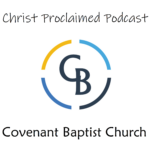“Who Will Restore All Things, Elijah Or Jesus?” and “What Should A Congregation Look For In An Elder?”


“Who Will Restore All Things, Elijah Or Jesus? What Should A Congregation Look For In An Elder?” is a Sunday School lesson from a Question and Answer series taught from Matthew 17:11, Acts 3:21 and 1 Timothy 3:1-7 by Noah Olguin, pastor of Covenant Baptist Church in New Berlin, Wisconsin – a confessional Reformed Baptist church subscribing to the 1689 London Baptist Confession of Faith.
Question 1: Who Restores All Things—Elijah or Jesus?
In Matthew 17:11, Jesus says, “Elijah will restore all things.” Meanwhile, Acts 3:21 states that Jesus will restore all things. The question is, who is responsible for restoring all things?
Elijah’s Role in Restoration
In Matthew 17:11, Jesus refers to John the Baptist as fulfilling the role of Elijah:
“Elijah does come, and he will restore all things.”
This points to John the Baptist coming in the spirit and power of Elijah, as seen in Luke 1:13–17:
The angel tells Zechariah that John will turn the hearts of fathers to their children, preparing people for the Lord.
In Malachi 4:5–6, Elijah’s coming before the Day of the Lord is prophesied, aligning with John’s mission to restore relational and spiritual integrity among God’s people.
John the Baptist restored what was entrusted to him—calling people to repentance and turning their hearts back to God. This is demonstrated in Matthew 3:5–6, where many came to him for baptism and confession of sins.
Jesus’ Role in Restoration
In Acts 3:21, we read that:
Heaven must receive [Jesus] until the time for restoring all the things about which God spoke through the prophets long ago.
This restoration refers to Jesus’ ultimate fulfillment of all divine promises—His return, judgment, and establishment of the new heavens and earth. Romans 8:18–23 describes creation’s eager anticipation of this renewal when sin and corruption will be eradicated.
Reconciling the Two
John, in the spirit of Elijah, restored all that was assigned to him as a prophet. Jesus, as the Messiah, will ultimately restore all creation. These roles are complementary rather than contradictory.
Question 2: What Should a Congregation Look For in a Potential Elder?
The qualifications for an elder are outlined in 1 Timothy 3:1–7 and Titus 1:5–9. Here are the key attributes and considerations:
The Calling to Be an Elder
An elder must first experience an inward call to the office, accompanied by the congregation’s confirmation of that call. This ensures the individual serves willingly and with genuine conviction.
Personal Qualities
- Above Reproach: Blameless in conduct, free from scandalous sin.
- Husband of One Wife: Faithful and sexually moral, avoiding polygamy or immorality.
- Sober-Minded, Self-Controlled, and Respectable: Thoughtful, sensible, and well-mannered.
Relational and Teaching Skills
- Hospitable: Open-hearted, with a genuine love for God’s people.
- Able to Teach: Skilled in conveying God’s Word for the congregation’s edification.
Behavioral Integrity
- Not a Drunkard: Avoiding excess and maintaining self-control.
- Not Violent but Gentle: Peaceable and kind, not intimidating or quarrelsome.
- Not a Lover of Money: Content and free from greed.
Household Management
An elder must manage their home well, demonstrating leadership and spiritual care in their family. This includes raising respectful and submissive children with dignity.
Spiritual Maturity
- Not a Recent Convert: Mature in faith, avoiding pride or instability.
- Respected by Outsiders: Maintaining a positive testimony before the broader community.
Additional Desirable Traits
Prayerfulness, diligent study of Scripture, pastoral care, servant-heartedness, and a life that exemplifies faith, love, and humility are essential qualities.
Closing Thoughts
These qualifications underscore the spiritual and relational depth required of an elder. While the office is noble, it demands humility, dedication, and a Christ-like character.

Leave a Reply